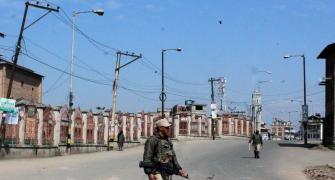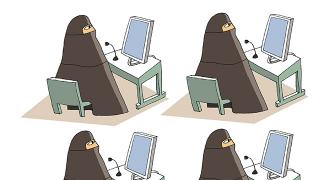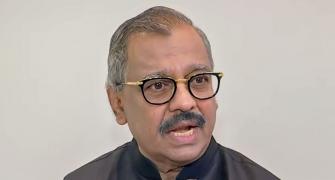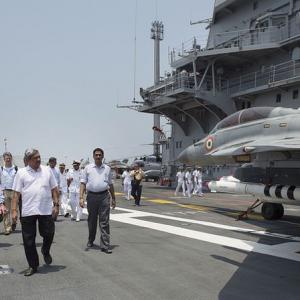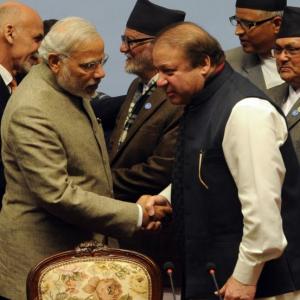'An authoritative source in the government tells me that India has emerged as the net security provider of the Maldives,' says Rajeev Sharma.
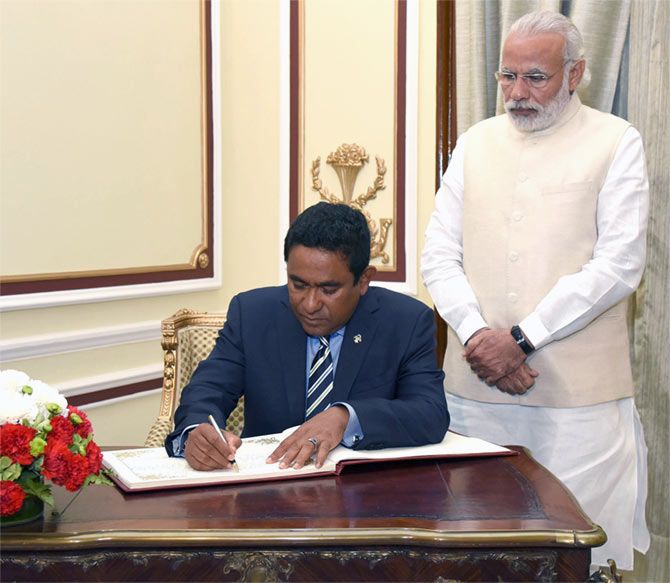
Has India pulled off a strategic coup of sorts in the Maldives, the Indian Ocean archipelago of ever-increasing strategic importance for New Delhi where Chinese shadows have steadily been lengthening over the years?
Has the Modi government struck truce with Maldivian President Yameen Abdul Gayoom, a perceived greater friend of China rather than India, during his just concluded India visit (April 10-11), his second visit to New Delhi in less than 23 months?
Now comes the mother of all questions in the context of India-Maldives relations: Has India finally edged past China in the two Asian giants' rivalries in the Maldivian strategic space and emerged as the net security provider of Maldives?
Key officials closely associated with the talks President Yameen had with Prime Minister Narendra Modi gave me an affirmative answer to all three questions listed above.
The game-changer that came about during Yameen's India visit was of the six agreements signed between the two sides on April 11, the most crucial was an 'action plan' on defence cooperation.
I am given to understand by an authoritative source in the Indian government that by virtue of this 'action plan' India has emerged as the net security provider of the Maldives.
The defence cooperation agreement between India and the Maldives is being kept under wraps. The Prime Minister's Office decided not to conduct a press conference by the two leaders, a norm when a foreign dignitary visits India and holds talks with the prime minister.
The only elaboration of the action plan on defence cooperation between India and the Maldives that has been given by the ministry of external Affairs is the following paragraph: 'Action Plan is in the context of defence cooperation being an important component of the India-Maldives bilateral relationship and the shared strategic and security interests of the two countries in the Indian Ocean region.'
'The Action Plan envisages an institutional mechanism at the level of the defence secretaries to further bilateral defence cooperation,' the MEA stated.
A key feature of the defence pact based on sources-based information is that India will supply critical defence equipment and hardware to the Maldives and will train Maldives defence personnel.
This is quite a mouthful given the extremely reserved and cautious diplomacy that the Manmohan Singh government conducted with virtually all friendly powers, including the Maldives. Dr Singh's government was stingy in committing the sale of defence equipment to friendly nations. The Maldives was no exception.
Now the Modi government has turned India's Maldives diplomacy on its head and made a pronounced and significant departure from the previous government's cautious approach.
Interestingly, around this time the Modi government was tightening the nuts and bolts of its new defence policy with the United States by announcing a declaration of intent to sign three defence-related foundation agreements with the US.
Actually, the defence pact with the Maldives and the declaration of intent to sign three landmark defence agreements with the US need to be seen together as both developments reveal how the Modi government is bringing about changes in India's foreign policy.
First, the twin developments show that the Modi government is taking on China in a pro-active manner and giving China a run for its money in the fast evolving international power matrix.
Second, under Modi, India's foreign policy is getting more aggressive and fearless.
This will inevitably bring a backlash from China. But many would say what more China can do after it has repeatedly blocked India's bid to seek United Nations action against Pakistan-based terrorists like Masood Azhar?
One will have to see how the India-Maldives defence cooperation action plan pans out in coming weeks and months. Of course, Chinese actions will have to be closely watched.
It will have to be seen at what scale the Modi government resumes defence equipment supplies to the Maldives and to what extent the two countries cooperate on defence issues to keep the Chinese at bay.
The Modi government's foreign policy engagements shift to China in a big way. Everything will depend on how astutely the Modi government conducts its diplomacy with the Chinese. Mark this space!
Rajeev Sharma is an independent journalist and strategic analyst who tweets @Kishkindha


